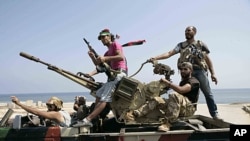NATO jets bombed bunkers in Moammar Gadhafi’s hometown Friday as the opposition council announced it plans to set up a new Libyan government in Tripoli.
Watch related Miriama Diallo video report
NATO planes pursued their attack on remnants of the Gadhafi regime Friday, pounding a bunker complex in his hometown, Sirte.
The bombing raids came as rebels massed forces outside Sirte, a port city on the Mediterranean. Preparing for an attack, the rebels softened up military targets with a heavy artillery barrage.
|
VOA's Sarah Williams speaks about the fighting with correspondent James Brooke, who is in Tripoli:
|
As civilians fled Sirte, tribal authorities in the city reportedly wanted to negotiate a surrender to avoid bloodshed. But hardline military officers vowed to keep on fighting.
And though opposition fighters controlled most of Tripoli, sporadic gunfire echoed through the capital as pockets of pro-Gadhafi holdouts resisted rebel efforts to expand control in the city. Fighting also continued at the international airport, where a passenger jet was on fire Friday afternoon.
On Friday morning, piped water supplies dribbled to an end in this city of one-and-a-half million people. By Friday evening, power, Internet and cell phone services were out around most of the capital.
To boost morale, the opposition’s provisional authority announced that it is starting to move from Benghazi to Tripoli.
Ali Tarhouni, finance minister in the opposition's Transitional National Council, announced to reporters in the capital, “Resumption of the work of the executive office in free Tripoli as of this moment.”
In a country with strong east-west divisions, many people in Tripoli were afraid that the Benghazi-based rebels would restore the capital to their eastern city. Libya’s capital was in Benghazi until then-Colonel Gadhafi’s coup, in 1969.
Kamal Ajeli, a Libyan who has returned here from Britain, praised the move.
“Any promise, they have to implement it. From day one, they said ‘Tripoli is our capital.’ Then, they better do it now, before people start having doubts,” said Ajeli.
The transitional administration is being set up, though, in a city that is only 85 percent under rebel control. Opposition leaders worried that pro-Gadhafi fighters could infiltrate back into the city and mount a stronger resistance.
Rebels leaders say only Gadhafi's capture or death will make his followers give up the fight. A group of Benghazi businessmen have put a $1.5 million "dead or alive" price on the head of the fugitive leader. Rebels say, however, they do not know where he is.




